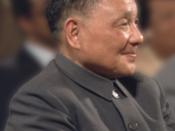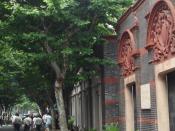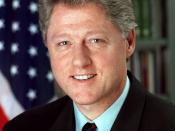In 1992, the year Bill Clinton took office, Deng Xiaoping said, "China and the US are different in ideology, there is no conflict between fundamental interests." (Bernstein and Munro 45) American interests and America's status as hegemon of the world explain what Deng meant. China wants to be the primary influence in Asia and ultimately, the dominant power on the planet (Mosher 95). Instead of choosing to fight against China's designs on the world, President Bill Clinton allowed them accumulate power and ultimately, through his inertness, he opened the door to Chinese hegemony in the 21st century. President Clinton did not draw a line in the sand against Chinese policies that were not advantageous. His actions did not prevent or even delay the rise to power China enjoys today. President Clinton made unnecessary concessions on trade issues that contributed to the United States' current 124$ billion trade deficit with China (census.gov).
In the areas of foreign policy and protecting the balance of power in Asia, Clinton made shows of force but later backed into appeasement. Clinton failed to demand human rights reform, force China into a system of bilateral free trade, and use economic benefits to secure political, social, and economic goals in Asia.
Trade is the most visible indicator of China's sharp angled rise to dominance. With our ballooning trade deficit to China, the US is at a serious economic disadvantage. In 1992, our trade deficit with China was 18$ billion. When Clinton left office in 2000, the trade deficit had ballooned to 84$ billion dollars. Because of this trade deficit, China has profited tremendously. With the money gained from the trade surplus China created the world's largest foreign exchange reserve, and deployed billions to buy state of the art weaponry from Russia and Western Europe. They also utilized...


